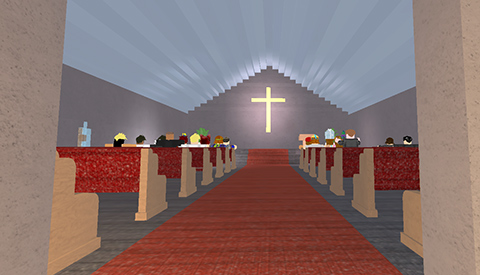For an online game, there isn’t much to the “God is Love” ministry. It’s basically a virtual island hovering in a cosmic stratosphere, with a few flowers blooming and a cross draped in a burgundy stole and illuminated from above by glorious rays. Nearby is a stone table with bread and wine. Visitors can hear a piano quietly playing as they pray and discuss their faith with others.
But by this Christmas, the site will have been visited more than 500,000 times. A place where young people can gather 24/7 to worship, pray and discuss their faith, “God is Love” is a ministry of The Robloxian Christians online church, a virtual church that offers Sunday worship, Bible studies, prayer services and more.
Since I founded the church seven years ago when I was 11, The Robloxian Christians has had remarkable success. With more than 17,000 members -- up from 4,500 in 2016 -- and a volunteer staff of more than 120, our numbers rival those of America’s largest congregations. Our members are older children and teens, roughly 10 to 18, and the faith community that we have built together is raw and vulnerable.
But does a virtual church -- especially a church composed of children and teens -- have any lessons for “real-world” churches, for brick-and-mortar churches and the broader church as a whole?
After seven years pastoring this amazing online community, I believe that it does. I hope that what I have learned and experienced may help those coming up behind me, as well as those who are doing missional work in existing churches around the world. Here’s just some of what I’ve learned.
Anyone who believes in Christ can serve God in ministry.
The Great Commission’s call to make disciples is not exclusive to college-educated, degree-bearing theologians. It is open to all of Christ’s disciples who are willing to take up their cross and follow him -- young and old, rich and poor, educated and uneducated.
In fact, one of the people who inspired me to start The Robloxian Christians was Pastor Gary Grabow of Living Water Missionary Assembly, a church that my grandparents attend in the small town of Ironwood, Michigan. Grabow founded the church out of his home in 1976.
Despite his lack of ministry experience, he was called by God to take a step of faith and lead. In the same way, I started the online ministry in 2011 with absolutely no idea where it would go or what “online” church meant. If an 11-year-old kid can lead a community of believers with God’s help, so can you.
Be prepared to fail.
Just because I felt God leading me to create an online church did not mean that it was easy. For the first two to three years, our growth was sluggish. I would send out an announcement about our online worship service, and maybe one person would show up.
Sometimes, of course, low attendance can be written off as just a bad week. But if nobody shows up week after week, it’s easy to become discouraged and burned out. I cannot tell you how many times I have seen passionate, Christ-focused young people create a new ministry in the virtual world, only to shut it down when no one shows up.
Going into ministry, “virtual” or “real,” you cannot expect instant success -- even if you pray for God’s blessing. The key is to keep showing up. Week after week. Day after day.
Ministry doesn’t have to be expensive.
I have seen and heard of many ministry leaders in the world of brick-and-mortar churches who fall into the assumption that ministry has to cost a million dollars. “We need the very best sound system,” they might say. Or, “Our church won’t thrive without an extensive marketing campaign.”
Maybe your congregation would do better with those things. But is it a deal breaker? Are you going to quit if you can’t afford the coolest website or the most expensive sound system? For the first six years of The Robloxian Christians, we had an annual budget of less than $1,000 -- which came almost entirely out of my own teenage pocket. Ministry doesn’t have to be expensive!
For us, with no payroll costs for pastors and youth ministers, money was not an issue. Our expenses were virtually nonexistent, because we built the church “building” and infrastructure in our spare time. In online ministry, time is more valuable than dollars. Yes, an online church can conduct ministry on the cheap. But brick-and-mortar congregations can also make very practical changes that can both increase the reach and reduce the cost of their ministries.
Meet people where they are.
Finally, I would recommend to you what I call “the Zacchaeus approach.” I have always loved the story of Zacchaeus. A tax collector, Zacchaeus worried that he was too short to see the passing Jesus over the crowd, so he climbed a tree for a better view. When Jesus came to the tree, he called Zacchaeus by name and said that he would go to his house that day.
I love that idea -- that Jesus went to Zacchaeus’ home. Jesus did not tell Zacchaeus to meet him later in the synagogue or in some other place. Jesus went to where Zacchaeus lived, where he was comfortable, and there Jesus did his transformative ministry.
This is why youth ministries like Young Life or Youth for Christ are so successful. They reach young people in the high schools, where they are. In the same way, in the online world, our church is already on the platform. We often do outreach in various online communities and games, where we are literally loving our neighbors where they hang out and play; plus, it doesn’t cost a dime.
More than our church’s amazing growth and incredible reach, what is most beautiful about The Robloxian Christians is simply how it brings young people together and into faith. In the virtual world, we light a fire of passion in young people to love one another across every boundary and borderline.
We don’t see division and hate in our ministry; together, we are living out the call to love our neighbors and make disciples of all people and all nations.
It is beautiful. And if an 11-year-old kid from Tacoma, Washington, can start a global church community, just imagine what you can do.
















